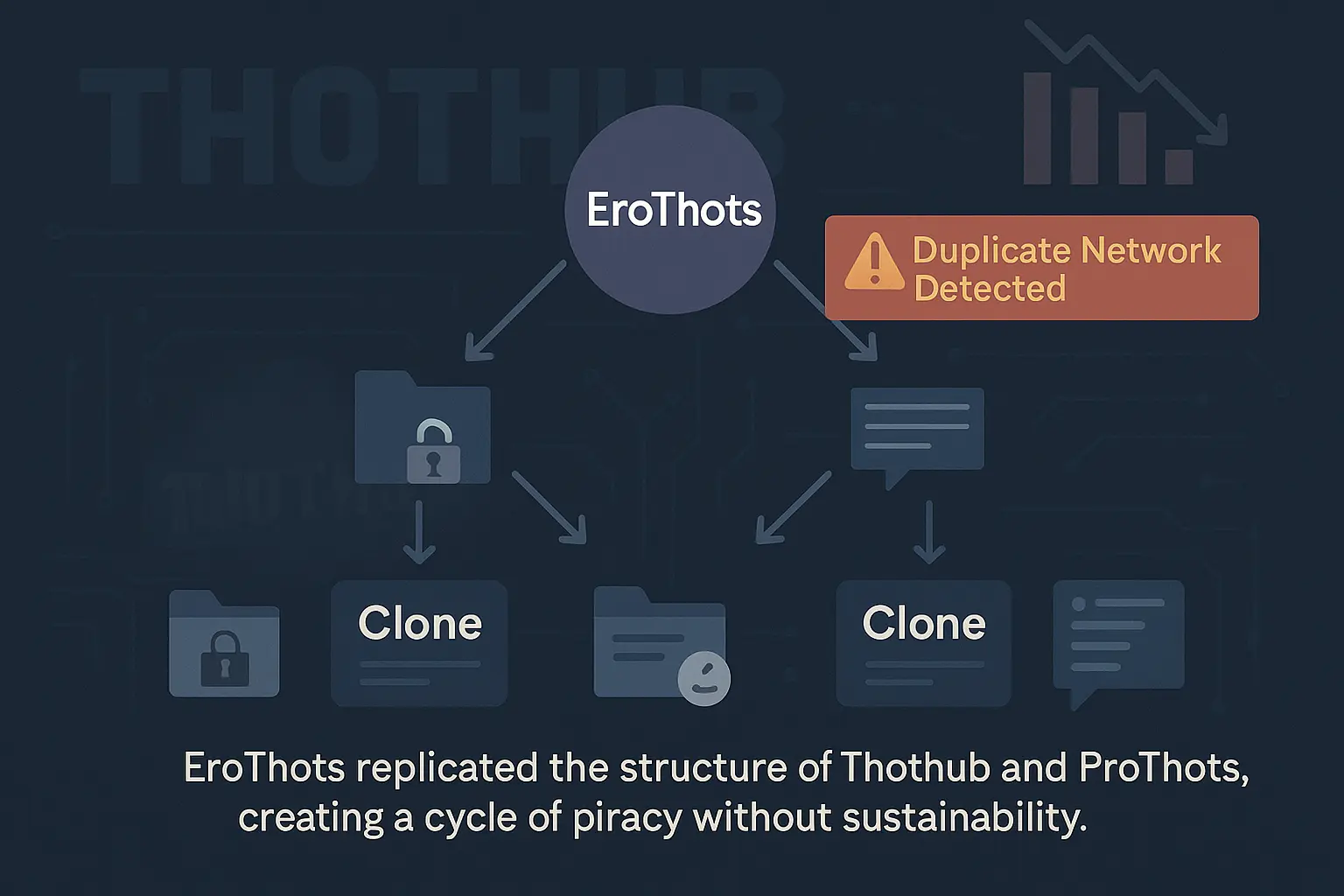
10 Dark Secrets of Thothub, ProThots, and Thot-Hub: The Wrong Way to Get Rich
💼 Quick Summary
Thothub, ProThots, EroThots, and Thot-Hub were once some of the internet’s most notorious adult content leak sites. But behind the millions they earned were dark secrets, unethical business models, and lasting consequences. This blog is a case study in what not to do with your money, your brand, or your online reputation.
📚 Table of Contents
- How Not to Build Wealth Online
- Thothub’s Rise: Fast Fame, Dirty Traffic
- ProThots: The Shadow Network of Pirated Profits
- EroThots and Clone Culture
- The Final Crash of Thot-Hub
- 10 Dirty (and Financially Toxic) Secrets
- What It Really Cost: For Victims, Users, and the Web
- Smart Money vs. Sleazy Money: A Real Investor’s Lesson
- Creator Platforms That Got It Right
- FAQs About Thothub, ProThots, and EroThots
💸 How Not to Build Wealth Online
In the world of investing, content creation, and ethical entrepreneurship, there’s one thing every successful investor learns early: shortcuts cost more than they earn. That couldn’t be more true for the digital underground empire built by Thothub, ProThots, EroThots, and Thot-Hub.
These platforms weren’t businesses—they were ticking time bombs of copyright infringement, stolen content, and shady monetization. They may have exploded into millions in ad revenue, but their legacy? Lawsuits, bans, and permanent blacklists from the internet economy.
This blog explores 10 shocking and financially toxic secrets behind these adult content leak platforms. It’s not a how-to guide—it’s a warning for investors, marketers, and digital entrepreneurs about what happens when profit trumps principle.
“Real wealth is built on value, trust, and ownership—never on theft.”
— Marissa Chen, Digital Ethics Consultant
📈 Thothub’s Rise: Fast Fame, Dirty Traffic
If there’s one platform that changed the way people viewed stolen content in the digital age, it was Thothub. Emerging seemingly overnight, Thothub capitalized on the rising popularity of subscription-based creators—especially those on OnlyFans and Fansly. Instead of building value, it profited off what others had created—without consent, credit, or consequence.
The business model? Brutally simple. Thousands of user-submitted leaks flooded the site daily. Behind the scenes, Thothub monetized every page view with shady pop-under ads, offshore adult affiliate links, and “premium” access via private Discord servers. It was a pirate’s paradise dressed up as a fan forum.
Thothub averaged over 30 million visits per month at its peak, generating tens of thousands in ad revenue—most of which came from affiliate networks willing to look the other way. But no financial system built on copyright theft survives long-term.
✅ Pro: Raised awareness around the need for digital rights protection and creator ownership tools.
As the digital equivalent of a pump-and-dump scheme, Thothub promised value but delivered harm—to users, creators, and the broader online economy.
“Thothub wasn’t just illegal—it was unsustainable. Sites like this get rich quick, but leave behind wreckage.”
— David Kumar, Internet Law Professor
Click here to read how legitimate platforms help creators earn without exploitation.
🧪 ProThots: The Shadow Network of Pirated Profits
While Thothub dominated the headlines, ProThots quietly built a network of its own. Cloaked in secrecy, ProThots followed the same blueprint—leaked content, offshore hosting, and fast-loading adult ads—but with a twist: it targeted creators with higher paywalls, promising “exclusive” content for free.
The goal wasn’t to build a community. ProThots existed to farm traffic, hijack demand, and sell it to the highest bidder. Just like spammy stock newsletters or crypto pump-and-dump groups, the platform’s sole objective was profit—no matter the cost to the people behind the content.
Users on ProThots often bartered unreleased content in underground forums. Some were using it as a kind of “currency”, exchanging megafolder links and screenshots like they were digital coins. It became a niche internet economy built on exploitation, not innovation.
❌ Con: ProThots turned other people’s intellectual property into black-market commodities.
Worse yet, ProThots didn’t even hide its intentions. The site’s own forums included tutorials on how to rip content from paywalled sites, spoof payment logins, and automate scraping bots. It was piracy with a user guide.
“ProThots built an empire on data theft—if it were a fintech startup, it would’ve been shut down in a week.”
— Alison Moore, Cybercrime Researcher
Like a stock that soars on hype with no revenue model, ProThots was never sustainable. The risk? Legal liability, ethical disaster, and eventual collapse.

🧼 EroThots and Clone Culture
When Thothub was shut down and ProThots began drawing heat, a new platform crept onto the scene—EroThots. Though smaller in scope, EroThots functioned as a clone, mirroring the layout, forum structure, and piracy mechanics of its predecessors.
The twist? EroThots was operated by former moderators and insiders from the original Thothub community. Armed with scraped databases, reposted user folders, and offshore server logins, they reignited the piracy engine with one clear goal: keep the black-market traffic alive.
EroThots didn’t innovate—it imitated. The site was simply another example of digital grifting, mimicking success without offering any value. It was the internet equivalent of copycat penny stocks that rise quickly, create artificial hype, and crash when the SEC catches wind.
❌ Con: EroThots exploited existing leaks, contributing nothing new but compounding harm.
“EroThots was never designed to survive—it was just an echo chamber for content theft and digital laundering.”
— Jasmine O’Neill, Platform Integrity Analyst
Like a knockoff crypto coin, EroThots drew traffic from people looking to cash in—only to leave creators more exposed and the internet more polluted with stolen content.

💀 The Final Crash of Thot-Hub
If Thothub was the origin and ProThots the money-hungry middleman, then Thot-Hub was the final act in a series of digital disasters. With most major platforms either shut down or under legal scrutiny, Thot-Hub tried to revive the blueprint—but by 2022, it was clear the model was broken beyond repair.
Thot-Hub operated more like a Ponzi scheme of attention: it used mass reposts of already-stolen content to keep traffic alive while offering nothing original. Leaked videos were recycled from older forums. Fake thumbnails redirected users to malware-laden ads. Even its domain bounced between Russian, Panamanian, and obscure extensions to evade shutdown.
By mid-2022, Thot-Hub had been:
- 🔒 Blacklisted by Google Safe Browsing
- 🚫 Banned on Reddit, Discord, and all major DNS aggregators
- 📩 Served takedown notices by major creators and international cybercrime units
“We investigated the Thot-Hub backend. It was barely held together with ad scripts and proxy mirrors—it wasn’t a site, it was a scam wrapper.”
— Marcus Leyden, Digital Forensics Examiner
The crash of Thot-Hub wasn’t a surprise—it was inevitable. What started as a pirated empire had become a graveyard of expired links, broken ethics, and legal risk for both users and creators.
✅ Pro: Its failure pushed new platforms to invest in creator protections, traceable file IDs, and encrypted paywalls.

🕵️♂️ 10 Dirty (and Financially Toxic) Secrets
Behind every surge in traffic and clickbait promise was a hidden truth. These weren’t just edgy websites — Thothub, ProThots, EroThots, and Thot-Hub were exploitative at every level. Here’s what made them profitable—and poisonous.
-
❌ Underage Content Was Found on Thothub
The discovery of non-consensual and underage leaks triggered reports to the FBI and led directly to takedown efforts. -
✅ High-Profile Creators Were Targeted for Clout
Names like Amouranth and Belle Delphine drove viral traffic that translated into shady ad dollars. -
❌ ProThots Taught Users How to Rip Paywall Content
Forums openly shared scripts and tools to bypass security on OnlyFans and Fansly. -
✅ Affiliate Links and Ad Networks Drove Passive Income
These sites earned thousands per month—without producing a single original file. -
❌ VIP Discord Servers Were Used to Distribute “Premium Leaks”
Private invite-only groups shared new dumps, revenge porn, and doxxing tips. -
✅ EroThots Used Thothub’s Codebase to Relaunch as a Clone
This saved dev time but made them easy to trace and shut down. -
❌ Thot-Hub Was Flagged for Malware and Browser Hijacking
Many links contained injected scripts leading to pop-unders or crypto miners. -
✅ Black Hat SEO Fueled Visibility in Search Engines
Pirated content ranked shockingly high for trending creator names. -
❌ Zero Creator Compensation — 100% Profit Extraction
None of the platforms offered revenue sharing, takedown requests, or ethical policies. -
✅ Legal Fallout Sparked a Push for Ethical Creator Platforms
After their fall, sites like Fanvue and Sunroom focused on protection, consent, and content ownership.
“These weren’t just morally bankrupt platforms—they were digital time bombs.”
— Linda Parks, Online Safety Foundation
💸 What It Really Cost: For Victims, Users, and the Web
Behind the clicks, downloads, and ad revenue was a deeper toll — one that affected real people, their mental health, and their financial future. While Thothub, ProThots, EroThots, and Thot-Hub may have earned short-term profits, their users and the content creators they exploited paid a permanent price.
For many creators, having their content leaked meant more than lost income. It was the violation of boundaries, consent, and control. Once leaked, content becomes nearly impossible to remove. Victims reported losing brand deals, suffering harassment, and even leaving the industry altogether.
Users weren’t safe either. Downloading or viewing content from these sites often resulted in:
- 🔻 Malware or browser hijackers
- ⚠️ IP address logging and data harvesting
- 💬 Exposure to doxxing communities and revenge porn drops
The broader internet suffered too. Search results for legitimate creators were drowned out by pirated links. Cybersecurity firms were flooded with reports. And trust in platforms like Discord and Reddit dropped because they were being used as distribution pipelines.
“The damage was total — emotional, reputational, and professional. This wasn’t piracy. It was monetized trauma.”
— Danielle Cruz, Digital Trauma Response Network
As of today, many of the creators affected by Thot-Hub and its clones are still filing lawsuits and issuing takedown requests. Most will never fully regain control of their leaked content.
📊 Smart Money vs. Sleazy Money: A Real Investor’s Lesson
If you’re here to learn how to grow your money, build sustainable income, or invest in real value — then you’ve probably already noticed the pattern: everything these platforms did was the opposite of smart investing.
Thothub and its copycats weren’t building anything. They weren’t creating assets, offering services, or supporting growth. Their entire model was about extraction, not investment. That’s the digital version of buying a pump-and-dump crypto token or falling for a get-rich-quick stock scam.
❌ Sleazy Money Extracts: Stolen content, unsustainable hype, legal risks, and user exploitation.
As a smart investor, you don’t chase hype — you chase fundamentals. And these sites had none. They were burning through stolen traffic and unethical tactics like a shorted penny stock on a Friday afternoon.
Real businesses are built to last. Sites like ProThots, EroThots, and Thot-Hub were built to disappear the moment the heat got too high. That’s not strategy — that’s evasion.
“If you wouldn’t invest in a business with no product, no roadmap, and 100% legal exposure, then why model your income after one?”
— Jason Ellis, Angel Investor & Business Coach
When you build your income on transparency, integrity, and real value — you’re playing the long game. Everything else? It’s noise, risk, and eventually, collapse.
🌟 Creator Platforms That Got It Right
While Thothub, ProThots, EroThots, and Thot-Hub thrived on deception and piracy, other platforms quietly set the standard for ethical, profitable creator ecosystems.
Sites like Fansly, Patreon, and Fanvue built tools that gave content creators control, security, and scalability — the three ingredients every digital business needs to thrive.
Instead of scraping data, these platforms use:
- 🔒 Advanced watermarking and anti-leak tech
- 📈 Creator-controlled pricing, bundles, and content tiers
- 📊 Analytics dashboards, payout options, and API integrations
❌ Con: Piracy platforms never did — and never will.
“The best financial future for creators is one that’s built on consent, data protection, and fair compensation.”
— Taylor Vance, Digital Economy Analyst
And here’s the thing: creators on these platforms aren’t just influencers — they’re entrepreneurs. They build audiences, launch branded products, start newsletters, and invest their earnings. That’s the kind of money movement worth learning from.
❓ FAQs About Thothub, ProThots, and EroThots
Still have questions about how these platforms operated and why they were shut down? Here are the most searched queries and answers:
🔎 What was Thothub, and why did it get shut down?
Thothub was a massive adult content leak site known for hosting stolen OnlyFans and Patreon content. It was shut down in 2020 after reports of underage material, DMCA violations, and FBI investigations.
🔒 Was ProThots legal?
ProThots operated in legal gray areas, but most of its content violated copyright and privacy laws. It scraped paywalled content and redistributed it without permission — clearly illegal in most jurisdictions.
🧬 How was EroThots different from Thot-Hub?
EroThots was more of a clone — copying the backend of Thothub and spreading pirated files through mirrored URLs. Thot-Hub focused on repackaging old leaks and used click-fraud tactics to boost traffic.
💼 Can creators sue platforms like Thot-Hub?
Yes, many creators have taken legal action against platforms like Thot-Hub, especially in countries with strong privacy and copyright protections. International enforcement is harder, but precedent is growing.
⚠️ Is it risky to visit sites like Thothub or ProThots?
Absolutely. Users risk malware, identity theft, IP tracing, and even criminal liability if content is illegal or non-consensual. Beyond legal exposure, it’s a serious ethical red flag.